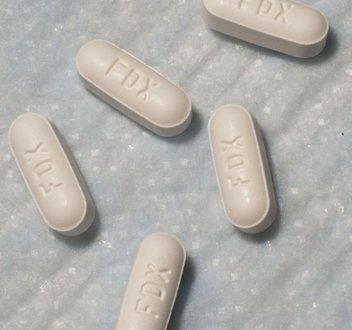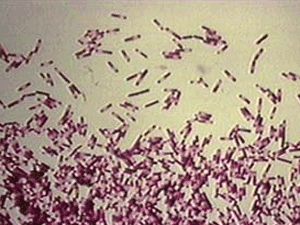


Compared with vancomycin, fidaxomicin (Optimer Pharmaceuticals, Inc) produces noninferior rates of clinical cure in adults with Clostridium difficile infection. In addition, for some strains, fidaxomicin is associated with a significantly lower rate of recurrence, according to the findings of a randomized trial.
Thomas J. Louie, MD, with the University of Calgary, in Calgary, Alberta, Canada, reported the study findings of the randomized phase 3 trial in the February 3 issue of the New England Journal of Medicine.
According to the researchers, fidaxomicin is a macrocyclic antibiotic that is more active in vitro than vancomycin in clinical isolates of C difficile, including the NAP1/BI/027 strain.
"This activity, in combination with minimal systemic absorption, high fecal concentrations, and limited activity in vitro and in vivo against components of the normal gut flora, makes fidaxomicin a promising candidate that may provide highly active but more selective therapy for C. difficile infection," the study authors write.
The current study included 629 adults with acute symptoms of C difficile infection, with a positive result on a stool toxin test. Patients were randomly assigned to receive fidaxomicin at a dose of 200 mg twice daily or vancomycin at a dose of 125 mg 4 times daily. Both medicines were taken orally for 10 days.
Of the patients, 548 (87.1%) could be evaluated for the per-protocol analysis. The rates of clinical cure with fidaxomicin were noninferior to those observed with vancomycin in both the modified intent-to-treat analysis (88.2% vs 85.8% with fidaxomicin vs vancomycin, respectively) and the per-protocol analysis (92.1% and 89.8%, respectively).
The median time to resolution of diarrhea was also shorter with fidaxomicin vs vancomycin (58 hours vs 78 hours in the modified intent-to-treat population and 55 hours vs 69 hours in the per-protocol population).
Recurrence of infection occurred in significantly fewer patients taking fidaxomicin vs vancomycin in both the modified intent-to-treat analysis (15.4% vs 25.3%; P = .005) and the per-protocol analysis (13.3% vs 24.0%; P = .004). In addition, the lower rate of recurrence was seen in patients with non–North American Pulsed Field type 1 strains.
The 2 treatments appeared to be mostly comparable with respect to adverse events. Significantly more serious adverse events related to laboratory test results occurred in the fidaxomicin group vs the vancomycin group (4.7% vs 1.2%; P = .01), although no participants discontinued the study because of allergy or intolerance. Potentially treatment-related adverse events included mild gastrointestinal tract and nonspecific symptoms, which occurred at a similar rate between the 2 groups.
Dr. Louie and colleagues suggest that the decreased recurrence rates with fidaxomicin may be explained by the fact that fidaxomicin is rapidly bactericidal, whereas vancomycin is bacteriostatic. "Along with its narrow antimicrobial spectrum, fidaxomicin also has a prolonged postantibiotic effect against C. difficile, which is not observed in the case of vancomycin," they suggest.
Editorial: New Drug Shows Promise
"Although therapy of C. difficile infection is fraught with challenges, fidaxomicin appears to be an important advance, notes Herbert L. DuPont, MD, with the University of Texas School of Public Health, St. Luke's Episcopal Hospital, Baylor College of Medicine, and Kelsey Research Foundation, all in Houston, Texas, in a related editorial.
"If studies with fidaxomicin confirm a favorable clinical response and a significant decrease in the rate of recurrence after treatment, this new agent could become a recommended therapy for C. difficile infection," Dr. DuPont adds.
Independent Comment: First Drug to Beat Vancomycin
John G. Bartlett, MD, professor of medicine at Johns Hopkins University School of Medicine, in Baltimore, Maryland, notes that fidaxomicin is the first drug to ever "beat oral vancomycin in a clinical trial for CDI [C difficile infection]."
According to Dr. Bartlett, the benefit with vancomycin was the result of decreased relapses, because it has a less pronounced impact on the colon microbiome, and "about 20-25% of patients have relapses so that is the population that will benefit," he told Medscape Medical News.
"Currently, oral vancomycin is the only drug that is FDA approved for CDI," Dr. Bartlett said. "Metronidazole is the other commonly used drug, but it is not as good as vancomycin and was never FDA approved for this indication."
Current Findings Add to Prior Coverage
The findings of the current study add to previous Medscape Medical News coverage of fidaxomicin. In January 2011, the US Food and Drug Administration (FDA) granted orphan drug designation for all formulations of fidaxomicin for the treatment of C difficile infection in pediatric patients 16 years and younger.In addition, a subgroup analysis presented in September 2010 of two phase 3 trials found that fidaxomicin is superior to vancomycin in treating recurrences of gastrointestinal C difficile infection.
The current study also confirms findings from a preliminary analysis presented early last year during a late-breaker session at the 20th Annual European Congress on Clinical Microbiology and Infectious Diseases in Vienna, Austria.
The study authors have received financial support and consulting fees from Optimer Pharmaceuticals and multiple other commercial interests. Disclosure forms provided by the study authors and by Dr. DuPont are available with the full text of this article at the New England Journal of Medicine Web site . Dr. Bartlett has disclosed no relevant financial relationships.
N Engl J Med. 2011;364:422-431, 473-475. Abstract





 留言列表
留言列表
 線上藥物查詢
線上藥物查詢 